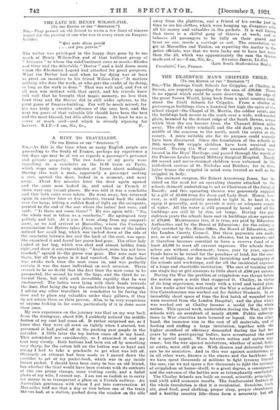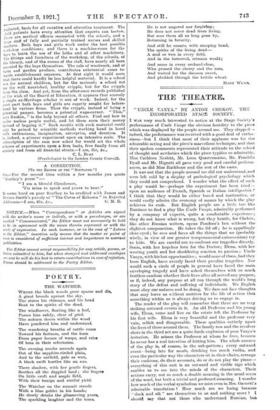THE EX-SERVICE MAN'S CRIPPLED CHILD.
[To THE EDITOR or THE " SPECTATOR."' SIR,—The Heritage Craft Schools for Cripples, at Chailey, is Sussex, are urgently appealing for the sum of £20,000. There is no appeal which could be more deserving. On the edge of the great Sussex Weald, lying back from a quiet country road, stand the Craft Schools for Cripples. From a cluster of picturesque buildings rises a hundred feet high the spire of the school chapel—the Chapel of St. Martin, the soldier saint; and the buildings look across to the south over a wide, well-wooded plain, bounded by the distant ridge of the South Downs, across -which blow the sea breezes from the Channel fifteen miles away. The old white windmill and the old dark yew, in the middle of the common to the north, mark the centre of the county. A more suitable site for its purpose could scarcely have been discovered. Since the foundation of the schools in 1903, nearly 900 cripple children have been received and treated. During the War over 500 wounded soldiers were housed in the Boys' Heritage, and passed through the wards of the Princess Louise Special Military Surgical Hospital. Nearly 600 scared and nerve-strained children were welcomed in the raid-shock centres of St. Nicholas and Botches; for in these latter homes the crippled in mind were treated as well as the crippled in body.
The eminent surgeon, Sir Robert Armstrong Jones, has in- sisted on the need for an operating theatre attached to the schools (himself undertaking to act as Chairman of the Surgkal Board); and this operating theatre was generously supplied by a gift of £5.000 from Sir Jesse and Lady Boot. Money, how- ever, is still imperatively needed to light it, to heat it, to equip it generally, and to provide it with an adequate supply of water. All the water is still pumped by hand; and all the buildings are still lit by dim, oil lamps. During the past eighteen years the schools have cost in buildings alone upwards of £70,000. Maintenance fees, it is true, are paid by Education Authorities and by the Board of Education; for the colony is fully certified by the Home Office, the Board of Education, and the London County Council. But these payments are made, not, as at our public schools, in advance, but in arrears; and it therefore becomes essential to have a reservs fund of at least £5,000 to meet all current expenses. The schools them- selves are without endowment; hence, year by year, special funds have to be raised for the purchase of land, for the erec- tion of buildings, for the needful furnishing and equipping of the schools and workshops, and for all the incidental expenses of a huge and charitable institution. The cost of training just one single boy or girl amounts to little short of £100 per annum.
During the War the problem of crippledom was thrust before the nation upon a scale that staggered it. Chailey, in virtue of its long experience, was ready with a tried and tested plan. A few weeks after the outbreak of the War a scheme of Educa- tive Convalescence was worked out for Soldier Students. In an incredibly short space of time the first batch of wounded men were received from the London Hospital; and the plan which was worked out at Chailey became a model for the whole nation. This special work, undertaken during the War, left the schools with an overdraft of nearly £4,000. Public subscrip- tions to War charities have lessened or lapsed. On the other hand, the immense rise in the cost of all materials, and of feeding and staffing a largo institution, together with the higher standard of efficiency demanded daring the last few years by the grant-paying bodies, have accentuated the need for a special appeal. Wars between nation and nation may cease; but the war against misfortune, whether of mind, body, or estate, must still go on. With disease and deformity there can be no armistice. And in this war against misfortune, as ' in all other wars, finance is the sinews and the backbone. If we have spent thousands of millions to fight tyranny beyond the seas, can we not spare a few thousands to fight the tyranny of crippledom at home—itself, to a great degree, a consequence, and the outcome of the battles now so triumphantly concluded•, The Chailey Schools are built on sound, scientific princiPle6- and yield solid economic results. The fundamental feature of the whole foundation is that it is residential. Sunshine, fresh air, good food, good clothing, proper sleep, proper cleanlinessi and a healthy country life—these form a necessary, but of regleeted, basis for all curative and educative treatment. The child patients have every attention that experts can bestow. There are medical officers connected with the schools, and a large staff of fully and partially trained nurses and skilled teachers. Both boys and girls work under the best possible ir,u-kshop conditions; and there is a machine-room for the hors to learn the use of the lathe and of other machinery. The fittings and furniture of the workshop, of the schools, of the library, and of the rooms of the staff, have nearly all been executed by the boys themselves. The sale of woodwork, and of farm and garden produce, contributes substantial sums to- wards establishment expenses. At first sight it would seem that there could hardly be less helpful material. It is a school net for normal children, but for the maimed; a school not for the well nourished, healthy cripple, but for the cripple from the slum. And yet, from the after-care records published at the wish of the Board of Education, it appears that scarcely a single ex-Heritage scholar is out of work. Indeed, for the most part both boys and girls aro eagerly sought for before- hand by various firms. Thus the cripple, instead of being a potential pauper, becomes a potential wage-earner. " This," bays Ruskin, " is the help beyond all others. Find out how to slake useless people useful, and let them earn their money instead of begging it." Such results with such material could only be gained by scientific methods working hand in hand pith enthusiasm, imagination, enterprise, and devotion. It is, indeed, a pioneer experiment upon an intensive scale. The subscription of the sum now asked for would set the whole scheme of experiments upon a firm basis, free finally from all anxiety and from all financial strain.—I am, Sir, &e., C. L. BURT
(Psychologist to the London County Council).











































 Previous page
Previous page